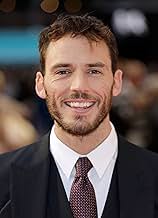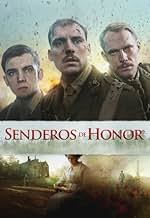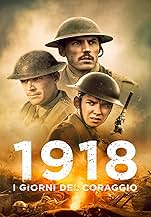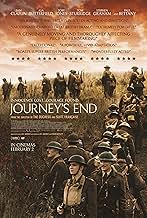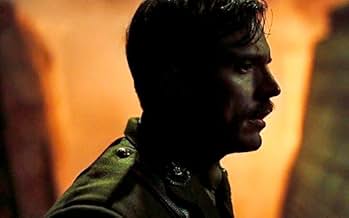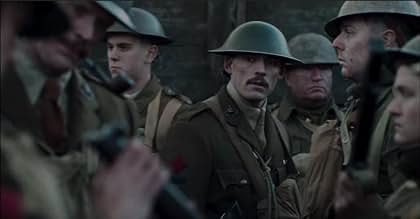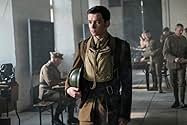NOTE IMDb
6,7/10
12 k
MA NOTE
Dans un tranché en l'Aisne en 1918, c'est une histoire d'un groupe d'officiers britanniques, menés par le jeune officier Stanhope qui perd ses facultés mentales, alors qu'ils attendent leur ... Tout lireDans un tranché en l'Aisne en 1918, c'est une histoire d'un groupe d'officiers britanniques, menés par le jeune officier Stanhope qui perd ses facultés mentales, alors qu'ils attendent leur destin.Dans un tranché en l'Aisne en 1918, c'est une histoire d'un groupe d'officiers britanniques, menés par le jeune officier Stanhope qui perd ses facultés mentales, alors qu'ils attendent leur destin.
- Réalisation
- Scénario
- Casting principal
- Récompenses
- 4 victoires et 3 nominations au total
Avis à la une
"Journey's End" takes place in the trenches of the Western Front in 1918. It was originally a very successful stage play in 1928 starring Lawrence Olivier in what must have been one of his first leading roles. In 1930 a film version was produced, one of the earliest British "talking pictures", directed by James Whale and starring Colin Clive (soon thereafter both were to re-team in the memorable films, "Frankenstein" and "Bride of Frankenstein).
The above is worth pointing out because the 1930 version which is still available for viewing on Youtube, makes an interesting comparison with this current production of the same story. That is because, meticulous as this production is, it was produced a century after the events depicted in the film. To the makers of this version, this material is ancient history. To the makers of the 1930 version, it was only a dozen years ago. Indeed, James Whale, who directed the 1930 film, actually had been a British officer on the Western Front during World War I. Consequently, to him, getting the details and the atmosphere right was not a matter of researching historical records, he had only to search his own memory.
Apart from the color photography and the differences in acting styles, one big difference is that the 1930 version had a lot more humor in. While the 2017 version seems unrelentingly grim, the characters in the 1930 version exhibit a lot more of the sort of dark humor that one might expect from troops in the front lines. It is almost as though that aspect of the play did not occur to the director, or else he had simply ignored it. Either that, or perhaps that sort of humor is now considered "politically incorrect".
Nevertheless, "Journey's End" is a highly evocative depiction of the Great War, and well worth seeing in this, the centennial of the end of "The War to End ALL Wars".
The above is worth pointing out because the 1930 version which is still available for viewing on Youtube, makes an interesting comparison with this current production of the same story. That is because, meticulous as this production is, it was produced a century after the events depicted in the film. To the makers of this version, this material is ancient history. To the makers of the 1930 version, it was only a dozen years ago. Indeed, James Whale, who directed the 1930 film, actually had been a British officer on the Western Front during World War I. Consequently, to him, getting the details and the atmosphere right was not a matter of researching historical records, he had only to search his own memory.
Apart from the color photography and the differences in acting styles, one big difference is that the 1930 version had a lot more humor in. While the 2017 version seems unrelentingly grim, the characters in the 1930 version exhibit a lot more of the sort of dark humor that one might expect from troops in the front lines. It is almost as though that aspect of the play did not occur to the director, or else he had simply ignored it. Either that, or perhaps that sort of humor is now considered "politically incorrect".
Nevertheless, "Journey's End" is a highly evocative depiction of the Great War, and well worth seeing in this, the centennial of the end of "The War to End ALL Wars".
Decided to watch this with my 13 year old son as he's learning about WW1 at school and I thought this may give him an insight as to how trench warfare would have felt for the men involved. He is a massive fan of all action cinema/TV from LOTR to GOT, and although I was completely involved in the film and felt the despair of every man on the front line, I feared that Zach might be disinterested as it was far more atmospheric than all out action. When we discussed certain aspect during the film he told me that his heart rate had been at about 120 bpm all the way through and that he was loving it. Tells you everything you need to know about this film. As stated before, this is not a war film, but a film about war and we loved it.
I just want to provide a quick calibration of what people should expect from this movie because some of the reviewers seem to have had a misconception of what this movie was supposed to be about. This is not a war movie - it's a movie about war. Specifically, the affects of trench warfare on a group of soldiers. Too that end, the movie is absolutely brilliant from the moment it begins to the moment it ends. You will not see long drawn out battle scenes, hand to hand combat, fire-fights, bloody carnage or anything else you've recently seen in Hacksaw Ridge, Lone Survivor or Fury. What you will see is the persistent and inevitable deterioration of the innocence and humanity of the characters as their fate, which they all know is coming, slowly but surely creeps up on them from one day to the next. Many other reviewers have used the term, "disturbing", to describe this movie and I agree 100%. It is highly disturbing, on a psychological level. You won't leave this movie feeling good or motivated to join the military; you will leave it with a loss to understand why humanity ends up in situations like this to begin with.
This is definitely one of the best war movies I have ever seen.
No Rambo actions in this one. The title really depicts what the movies is all about A Journey's End. The brutality of war. Good men die like that . In times of war orders are orders. It is sad. I wonder all this potential gone to waste . Over 60 million people died in world wars. Countries destroyed. I wonder how the world would have been liked if only ...
I recommend you see this movie with high quality video . The sound is amazing& the cinematic . The acting is superb .
If you think that war is exciting . Think again . You ought to see it. Deserves a better rating.
What a contrast to so much mediocrity and worse eg. Dunkirk. Set in the trenches in March 1918 but not really about the trenches or March 1918 at all.
Superbly cast and acted, a beautifully written reflection of a junior officer's view of the penultimate stages of WW1. Even more, this is a beautifully written reflection on the human spirit in adversity. Of course some of the senior officers are somewhat caricatured - that is what happens in real life. Of course it becomes more and more difficult with the passage of time for people to understand the mentality of empire, the public schoolboy ethos embodied by Raliegh, Maybe the same bravado and fear affects people joining violent gangs - I know not - but Raleigh is about the same age as some gang members - 18/19. Stanhope at 21/22 is a veteran of war, Uncle (Osborne - quite possibly early 30s) almost a veteran of life in their eyes.
Of course such characters have been used in films since - but this was written in 1928. It cut the new ground - others have followed.
The Roman Horace said "Dulce et decorum est pro patria mori." and it took until WW2 for Patton to say "The object of war is not to die for your country but to make the other bastard die for his." But what about sending your friends, your very best friends, your nearest and dearest to near certain death. What does that "do" to a man. Stanhope knows and through this film we can maybe glimpse that horror. What happens when there is no "cunning plan" left. Uncle knew.
Hold them off for as long as you can. In 1914, in 1918 when Journey's End is set, and again at Dunkirk ordinary men really did. No doubt there are countless other examples both before and in the last 70 years.
This film is a fitting tribute to those men.
Superbly cast and acted, a beautifully written reflection of a junior officer's view of the penultimate stages of WW1. Even more, this is a beautifully written reflection on the human spirit in adversity. Of course some of the senior officers are somewhat caricatured - that is what happens in real life. Of course it becomes more and more difficult with the passage of time for people to understand the mentality of empire, the public schoolboy ethos embodied by Raliegh, Maybe the same bravado and fear affects people joining violent gangs - I know not - but Raleigh is about the same age as some gang members - 18/19. Stanhope at 21/22 is a veteran of war, Uncle (Osborne - quite possibly early 30s) almost a veteran of life in their eyes.
Of course such characters have been used in films since - but this was written in 1928. It cut the new ground - others have followed.
The Roman Horace said "Dulce et decorum est pro patria mori." and it took until WW2 for Patton to say "The object of war is not to die for your country but to make the other bastard die for his." But what about sending your friends, your very best friends, your nearest and dearest to near certain death. What does that "do" to a man. Stanhope knows and through this film we can maybe glimpse that horror. What happens when there is no "cunning plan" left. Uncle knew.
Hold them off for as long as you can. In 1914, in 1918 when Journey's End is set, and again at Dunkirk ordinary men really did. No doubt there are countless other examples both before and in the last 70 years.
This film is a fitting tribute to those men.
Le saviez-vous
- AnecdotesPlaywright R.C. Sherriff had seen first-hand the effect of years of war on his friends and knew the fear and terror of waiting for an impending attack, waiting for his journey's end. The characters in the play are a reflection of the men Sherriff had served with in the 9th Battalion of the East Surrey Regiment.
- GaffesA common misconception is the myth about having your chinstrap unbuckled. It is mainly an American thing that was spread in WW2. Fact is, if the concussion was strong enough to hurt your neck or face because your chinstrap was buckled, the force of the same concussion would more than likely kill you. Having your strap undone just meant you would spend a lot of time holding your helmet on while moving fast.
- Citations
Lieutenant Osborne: Every little noise up there, makes me feel sick.
- ConnexionsFeatured in Projector: Journey's End (2018)
- Bandes originalesElevation
Written and performed by Hildur Guðnadóttir
Meilleurs choix
Connectez-vous pour évaluer et suivre la liste de favoris afin de recevoir des recommandations personnalisées
- How long is Journey's End?Alimenté par Alexa
Détails
- Date de sortie
- Pays d’origine
- Langues
- Aussi connu sous le nom de
- Journey's End
- Lieux de tournage
- Sociétés de production
- Voir plus de crédits d'entreprise sur IMDbPro
Box-office
- Montant brut aux États-Unis et au Canada
- 161 796 $US
- Week-end de sortie aux États-Unis et au Canada
- 11 798 $US
- 18 mars 2018
- Montant brut mondial
- 970 809 $US
- Durée1 heure 47 minutes
- Couleur
- Rapport de forme
- 1.85 : 1
Contribuer à cette page
Suggérer une modification ou ajouter du contenu manquant

Lacune principale
By what name was Men of Honor (2017) officially released in India in Hindi?
Répondre




